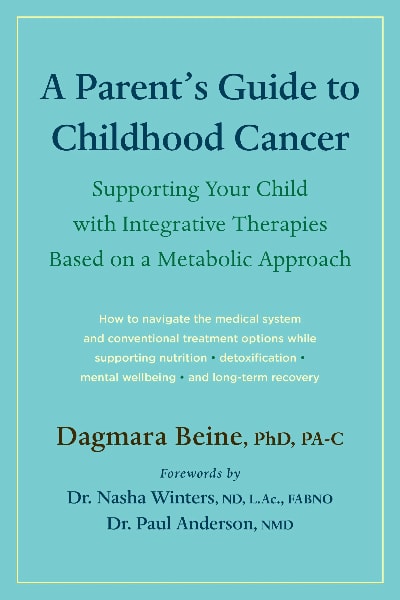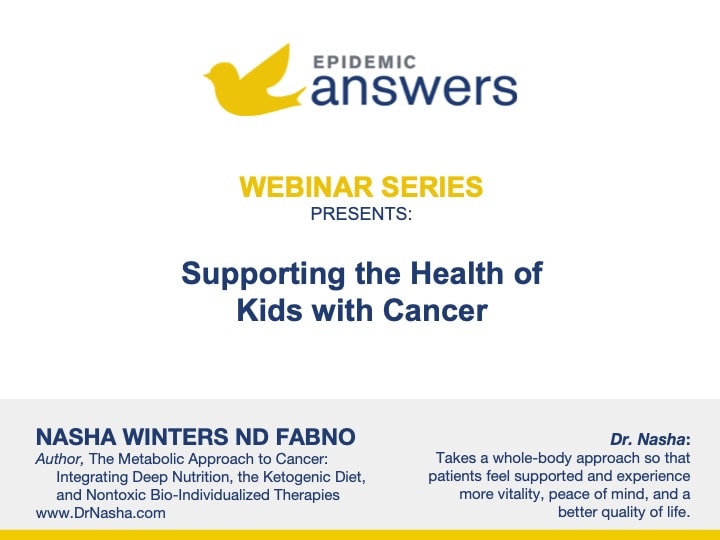We interviewed Dagmara Beine, author of A Parent’s Guide to Childhood Cancer, about integrative approaches to pediatric cancer. Please note that you will be asked to provide your email address at the 30-minute mark to continue viewing the replay.
About Pediatric Cancer
Cancer is the leading cause of death by disease for non-infant children in the United States. Between 2003 and 2019, the incidence rate of pediatric cancer was 178.3 per one million children, meaning that about 15,000 children are diagnosed with it every year. In addition, during this time period, the incidence rate increased 0.5% per year. A pediatric cancer diagnosis can be devastating emotionally, physically and financially for a child’s family.
The standard of care for cancer usually entails surgery, radiation and/or chemotherapy, depending on the type of cancer. In addition, some parents may choose to use complementary therapies such as naturopathic oncology, special diets, special therapies and more.
In This Webinar
In this webinar, Dr. Beine helped us answer the following questions:
- How can an integrative approach to cancer treatment complement traditional treatment?
- What are good resources for parents to use when finding practitioners for their integrative team?
- What are special considerations to take into account for pediatric cancer patients?
- What are level 1 and level 2 nutrition described in your book, A Parent’s Guide to Childhood Cancer?
- What is the metabolic approach to cancer?
- Why is the ketogenic diet so helpful in cancer and when should it be used?
- What are good target ranges for blood glucose and hemoglobin A1C for a pediatric cancer patient? Why?
- What are the “trifecta labs” (C-reactive protein, erythrocyte sedimentation rate and lactate dehydrogenase) and why do they offer insight into treatment and healing progression?
- How do the MTHFR genetic mutation and other SNPs affect cancer?
- Why is healing the gut important for cancer patients?
- What role does vitamin D have on cancer?
- What about fecal transplants for children whose gut microbiome has been destroyed by cancer treatment?
- Do parasitical infections play a role in cancer?
About Dagmara Beine PhD PA-C
Dr. Dagmara Beine, PA, is a functional and integrative medicine practitioner whose journey into the field has been deeply personal for herself and her family. After spending 12 years working in emergency medicine, Dr. Beine witnessed the life-saving benefits of western medicine on a daily basis. However, her perspective shifted when her three-year-old daughter was diagnosed with cancer.
During her daughter’s treatment and recovery, Dr. Beine observed firsthand the limitations of western medicine in treating the whole person. She sought out integrative practitioners from around the world to learn from and incorporate a holistic approach into her daughter’s care, including nutrition, supplements, detoxification, and mindfulness.

This experience was transformative for Dr. Beine both personally and professionally. She continued to study with leaders in the field and earned a PhD in Integrative Medicine, with a mission to help others facing a range of health challenges such as chronic pain, fatigue, migraines, IBS, eczema, and more. By identifying the root cause of these conditions, Dr. Beine believes that natural steps can be taken toward healing. She is the author of A Parent’s Guide to Childhood Cancer: Supporting Your Child with Integrative Therapies Based on a Metabolic Approach. You can find out more about her and her work at her website: https://www.zuzasway.com/
Disclaimer
This webinar is not a substitute for medical advice, treatment, diagnosis, or consultation with a medical professional. It is intended for general informational purposes only and should not be relied on to make determinations related to treatment of a medical condition. Epidemic Answers has not verified and does not guaranty the accuracy of the information provided in this webinar.
Still Looking for Answers?
Visit the Epidemic Answers Practitioner Directory to find a practitioner near you.
Join us inside our online membership community for parents, Healing Together, where you’ll find even more healing resources, expert guidance, and a community to support you every step of your child’s healing journey.
Sources & References
Accurso, A., et al. Dietary carbohydrate restriction in type 2 diabetes mellitus and metabolic syndrome: time for a critical appraisal. Nutr Metab (Lond). 2008 Apr 8:5:9.
Aggarwal, B.B., et al. Molecular targets of dietary agents for prevention and therapy of cancer. Biochem Pharmacol. 2006 May 14;71(10):1397-421.
Allen, B.G., et al. Ketogenic diets as an adjuvant cancer therapy: History and potential mechanism. Redox Biol. 2014:2:963-70.
Anand, P., et al. Cancer is a preventable disease that requires major lifestyle changes. Pharm Res. 2008 Sep;25(9):2097-116.
Anemoulis, M., et al. Intermittent Fasting in Breast Cancer: A Systematic Review and Critical Update of Available Studies. Nutrients. 2023 Feb; 15(3): 532.
Bahr, L.S., et al. Ketogenic diet and fasting diet as Nutritional Approaches in Multiple Sclerosis (NAMS): protocol of a randomized controlled study. Trials. 2020 Jan 2;21(1):3.
Coller, H.A. Is cancer a metabolic disease? Am J Pathol. 2014 Jan;184(1):4-17.
Duan, W., et al. Hyperglycemia, a neglected factor during cancer progression. Biomed Res Int. 2014:2014:461917.
Giovannucci, E., et al. Diabetes and cancer: a consensus report. Diabetes Care. 2010 Jul;33(7):1674-85.
Labbé, D.P., et al. Role of diet in prostate cancer: the epigenetic link. Oncogene. 2015 Sep 3;34(36):4683-91.
Liu, H., et al. Refined fructose and cancer. Expert Opin Ther Targets. 2011 Sep;15(9):1049-59.
Lombardi, C., et al. Residential proximity to pesticide application as a risk factor for childhood central nervous system tumors. Environ Res. 2021 Jun;197:111078.
Lorenzi, M., et al. High glucose induces DNA damage in cultured human endothelial cells. J Clin Invest. 1986 Jan;77(1):322-5.
Onodera, Y., et al. Increased sugar uptake promotes oncogenesis via EPAC/RAP1 and O-GlcNAc pathways. J Clin Invest. 2014 Jan;124(1):367-84.
Pedretti, L., et al. Role of Nutrition in Pediatric Patients with Cancer. Nutrients. 2023 Feb; 15(3): 710.
Seyfried, T.N. Cancer as a metabolic disease. Nutr Metab (Lond). 2010 Jan 27:7:7.
Seyfried, T.N. Cancer as a metabolic disease: implications for novel therapeutics. Carcinogenesis. 2014 Mar;35(3):515-27.
Seyfried, T.N., et al. Consideration of Ketogenic Metabolic Therapy as a Complementary or Alternative Approach for Managing Breast Cancer. Front Nutr. 2020 Mar 11:7:21.
Seyfried, T.N., et al. Is the restricted ketogenic diet a viable alternative to the standard of care for managing malignant brain cancer? Epilepsy Res. 2012 Jul;100(3):310-26.
Seyfried, T.N., et al. Metabolic management of brain cancer. Biochim Biophys Acta. 2011 Jun;1807(6):577-94.
Siegel, D.A., et al. Counts, incidence rates, and trends of pediatric cancer in the United States, 2003-2019. J Natl Cancer Inst. 2023 Nov 8;115(11):1337-1354.
Takano, T., et al. Glutamate release promotes growth of malignant gliomas. Nat Med. 2001 Sep;7(9):1010-5.
Tinkum, K.L., et al. Fasting protects mice from lethal DNA damage by promoting small intestinal epithelial stem cell survival. Proc Natl Acad Sci U S A. 2015 Dec 22;112(51):E7148-54.
Resources
Books
Beine, Dagmara. A Parent’s Guide to Childhood Cancer: Supporting Your Child with Integrative Therapies Based on a Metabolic Approach. Chelsea Green Publishing, 2024.
Bernstein, Richard K. Dr. Bernstein’s Diabetes Solution: The Complete Guide to Achieving Normal Blood Sugars. Little, Brown Spark, 2011.
Perro, Michelle MD, et al. What’s Making Our Children Sick?: How Industrial Food Is Causing an Epidemic of Chronic Illness, and What Parents (and Doctors) Can Do About It. Chelsea Green Publishing, 2017.
Seyfriend, Thomas. Cancer as a Metabolic Disease: On the Origin, Management, and Prevention of Cancer. Wiley, 2012.
Winters, Nasha. The Metabolic Approach to Cancer: Integrating Deep Nutrition, the Ketogenic Diet, and Nontoxic Bio-Individualized Therapies. Chelsea Green Publishing, 2017.
Websites
Dr. Bernstein’s Diabetes Solution
Metabolic Terrain Institute of Health



